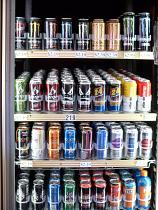What you should know about energy drinks
(NC)—Energy drinks are a unique product offering in Canada and the Canadian Beverage Association recognizes that many Canadians have questions about why and how energy drinks should be consumed.
What are energy drinks?
Health Canada says: “Energy drinks are meant to supply mental and physical stimulation for a short period of time. They usually contain caffeine, taurine, vitamins and glucuronolactone, a carbohydrate."
While energy drinks are available in a wide range of flavours, formulations and formats in Canada, they share the following attributes:
• are formulated and sold as Natural Health Products (NHPs)
• contain caffeine
• are intended to supply temporary physical and/or mental stimulation restoring alertness and wakefulness when fatigued or drowsy.
Who should consume energy drinks?
Energy drinks are formulated and recommended for people who are looking for additional mental and physical stimulation for short periods of time. Energy drinks are not recommended for children, pregnant or breastfeeding women, or people who are sensitive to caffeine.
As with all NHPs, it is important to read the label and use as directed. Energy drink labels in Canada contain information on recommended use, recommended dosage, intended population, any cautions, and lists of medicinal and non-medicinal ingredients, as well as the amounts of each medicinal ingredient.
How many energy drinks should be consumed in a day?
It is very important to read the product label to understand the recommended daily dosage, as can size and ingredients vary. The maximum recommended dosage is typically one or two cans a day. In addition, consumers should be aware of their caffeine intake from other sources (regular and specialty coffees, tea, chocolate, other NHPs, over-the-counter medications, etc.) and adjust their intake accordingly.
Should energy drinks be mixed with alcohol?
As stated on the label, energy drinks are not recommended to be mixed with alcohol. The Association and its members do not promote mixing energy drinks with alcohol.
Are energy drinks safe?
In Canada, energy drinks are classed as NHPs because they make verified functional claims and because of their ingredients, such as caffeine, taurine and vitamins. Energy drinks are regulated and reviewed by Health Canada for their quality and safety and must display recommended conditions for use and cautions on their labels. Consumers can identify energy drinks authorized for sale by Health Canada by looking for the Natural Product Number (NPN) or Exemption Number (EN) on the label or by visiting the EN and NPN databases: webprod3.hc-sc.gc.ca/product-produit/search-recherche (EN database) and webprod.hc-sc.gc.ca/lnhpd-bdpsnh/index (NPN database).
Energy drinks are currently sold in more than 160 countries around the world. Health authorities and scientific expert panels in these various jurisdictions have assessed energy drinks and their ingredients and have concluded that energy drinks are beverages that can be safely consumed as foods.
Always read the label before consuming and do not exceed the recommended dose.
How much caffeine is in an energy drink?
Mainstream energy drinks, those products that represent the vast majority of sales in the energy drinks category in Canada, typically contain between 70 mg and 200 mg of caffeine per dose.
When consuming the maximum recommended daily dose for most mainstream energy drinks, caffeine intake would be comparable to less than two cups of coffee.
Are energy drinks and sports drinks the same thing?
No, energy drinks should not be confused with sports drinks. Sports drinks are beverages that are specifically formulated to re-hydrate the body and usually provide carbohydrate energy needed for physical activity. Sports drinks also replenish electrolytes which maintain sodium and potassium balances in the body.
What are Natural Health Products?
Under Health Canada's Natural Health Products Regulations, NHPs are defined as naturally occurring substances or their synthetic equivalents that are used to restore or maintain good health. NHPs, often called "complementary" or "alternative" medicines, include: vitamins and minerals, herbal remedies and homeopathic or traditional medicines.
NHPs must be safe to be used as over-the-counter products and do not require a prescription.
More information on this topic or other beverage related topics, visit the Canadian Beverage Association's website at www.canadianbeverage.ca.
Comments
There are 0 comments on this post













